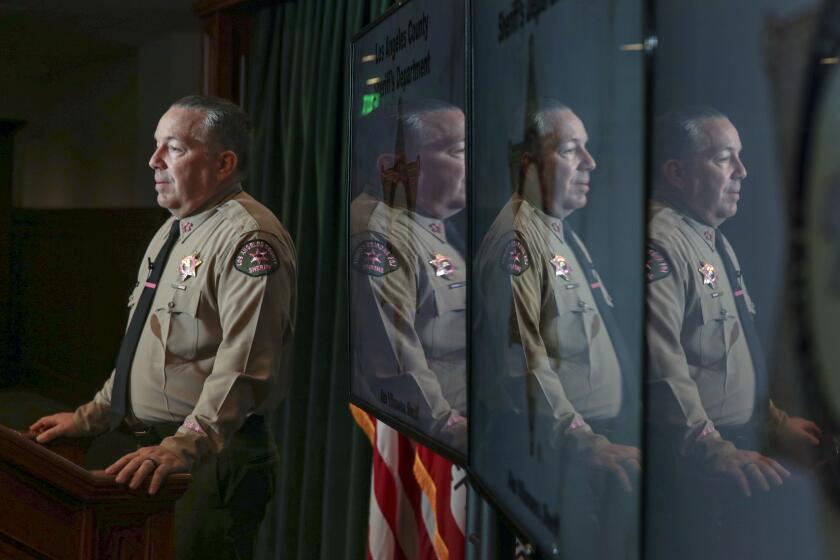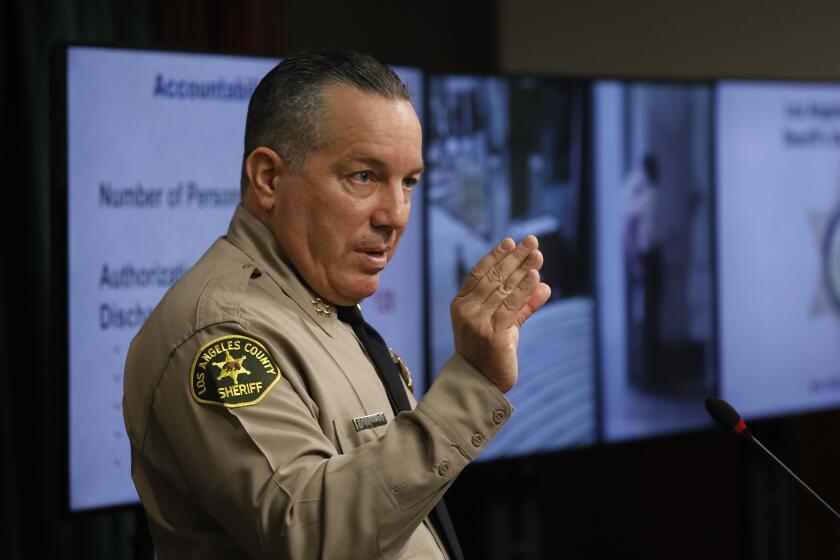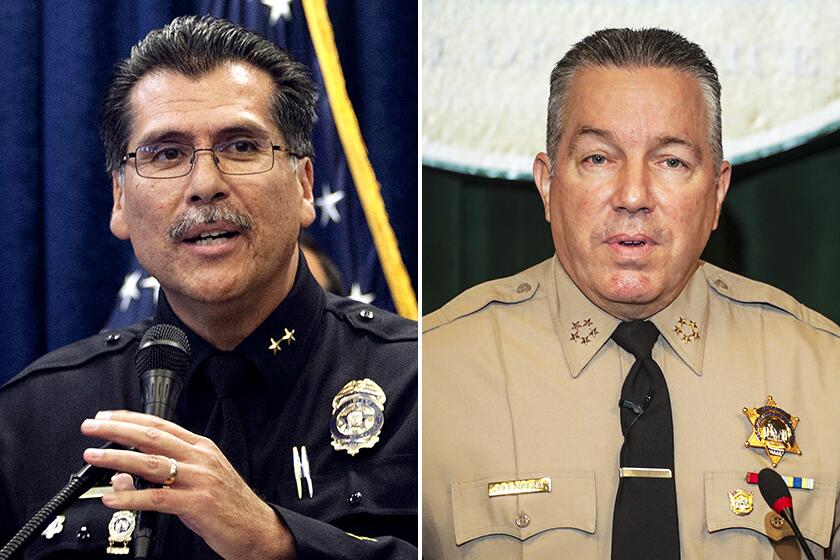Inside L.A. County sheriff’s dubious corruption probe of Sheila Kuehl, another watchdog
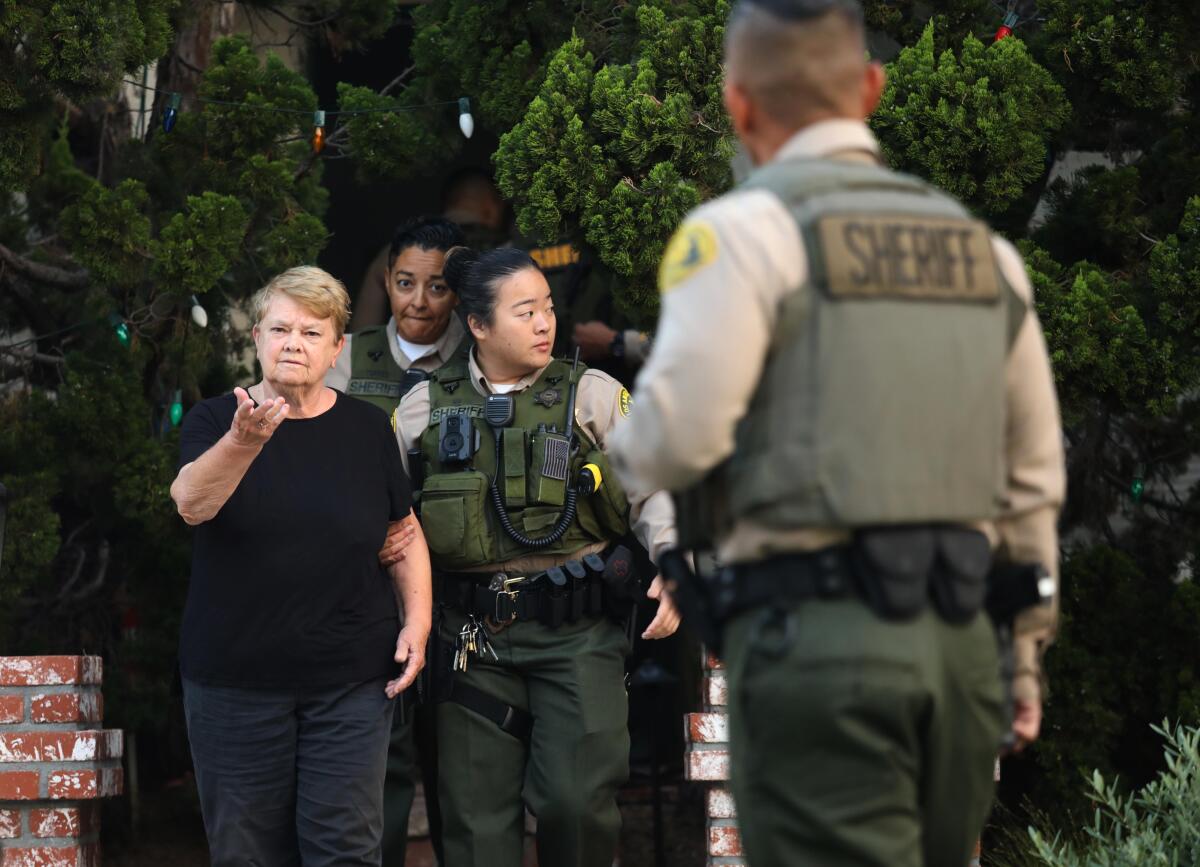
- Share via
Long before detectives from the Los Angeles County Sheriff’s Department showed up at Sheila Kuehl’s house with a search warrant, it was clear this was no ordinary corruption investigation.
The department had spent three years looking into an allegation that Kuehl, a county supervisor and one of Sheriff Alex Villanueva’s harshest critics, had taken bribes from a friend in return for Metropolitan Transportation Authority contracts.
The investigation fit a pattern. Since his election in 2018, Villanueva has fiercely resisted oversight by Kuehl, her colleagues on the Board of Supervisors, and other watchdogs monitoring alleged wrongdoing in his department.
Prosecutors had declined to file charges in the Kuehl case, telling sheriff’s investigators last year that they lacked the evidence they would need at trial.
Had the investigation ended there it might have been just a footnote in Villanueva’s tumultuous tenure. But in the closing weeks of his run for a second term, deputies with guns and battering rams were dispatched to rummage through Kuehl’s home in Santa Monica, her friend’s house in Del Rey and four offices around downtown L.A.
The sheriff’s detectives seized 67 smartphones, iPads, laptops and other digital devices, including some that Metro and Kuehl say the warrants did not authorize them to take. Some of the seized devices contain private communications about investigations into alleged misconduct by the sheriff himself and those who work for him, court records show.
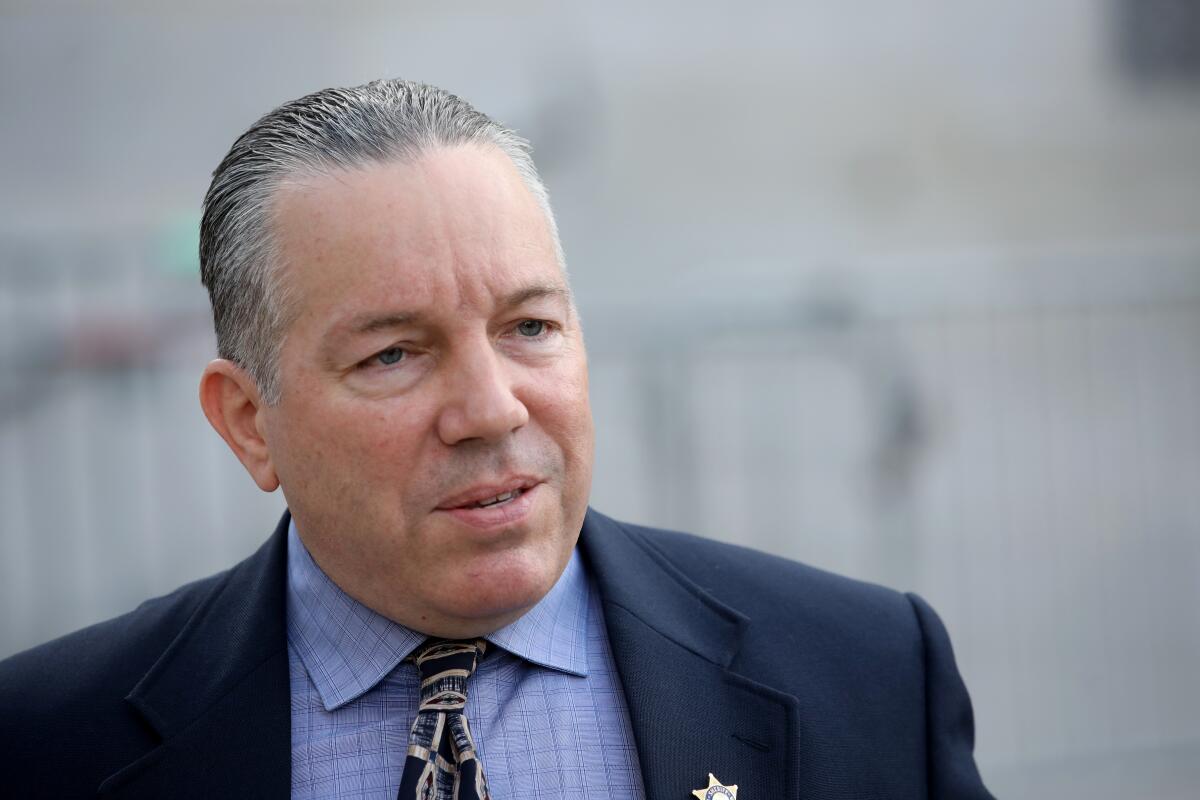
While strict secrecy normally shrouds public corruption investigations, Villanueva has heavily publicized this one. For seven weeks, his department has flaunted it at the top of its website, posting links to 191 pages of documents describing the case. Villanueva’s campaign has also posted YouTube ads portraying Kuehl as corrupt.
A Times review of the case found it is based on the testimony of just one person, a former Metro employee named Jennifer Loew, who brought her bribery complaint to at least four law enforcement agencies, but found a receptive audience only at the Sheriff’s Department. The Times found no evidence to support Loew’s allegation.

In the aftermath of the Sept. 14 raids, Villanueva has cited the investigation as a prime example of what he frames as his effort to root out corruption by an entrenched Democratic establishment. Kuehl and other adversaries say it’s a case of the sheriff abusing his power.
For Kuehl, 81, the spectacle of the raid has cast a pall over the waning days of her 22 years in public office, most of them as a state lawmaker who championed liberal causes. She has declined to seek a third term as county supervisor for the Westside, Malibu and the San Fernando Valley.
“I began my political career under threat by bullies because I was the first gay or lesbian person ever elected to the California Legislature,” she said by email. “And now, apparently, I will retire from public service once more under threat by a bully.”
Kuehl’s troubles over the Metro contracts began improbably with a chronic problem on public transit: sexual harassment.
Surveys in 2013 and 2014 found that 22% of Metro bus and subway riders had experienced unwanted sexual attention and 14% of passengers had been groped.
Metro’s communications staff decided to do something about it. Paul Gonzales, then a Metro spokesman, said he found Peace Over Violence — a nonprofit led by Kuehl’s friend, Patti Giggans — in an internet search. The group is dedicated to domestic violence prevention. Gonzales said he “cold-called Patti Giggans like a salesman.”
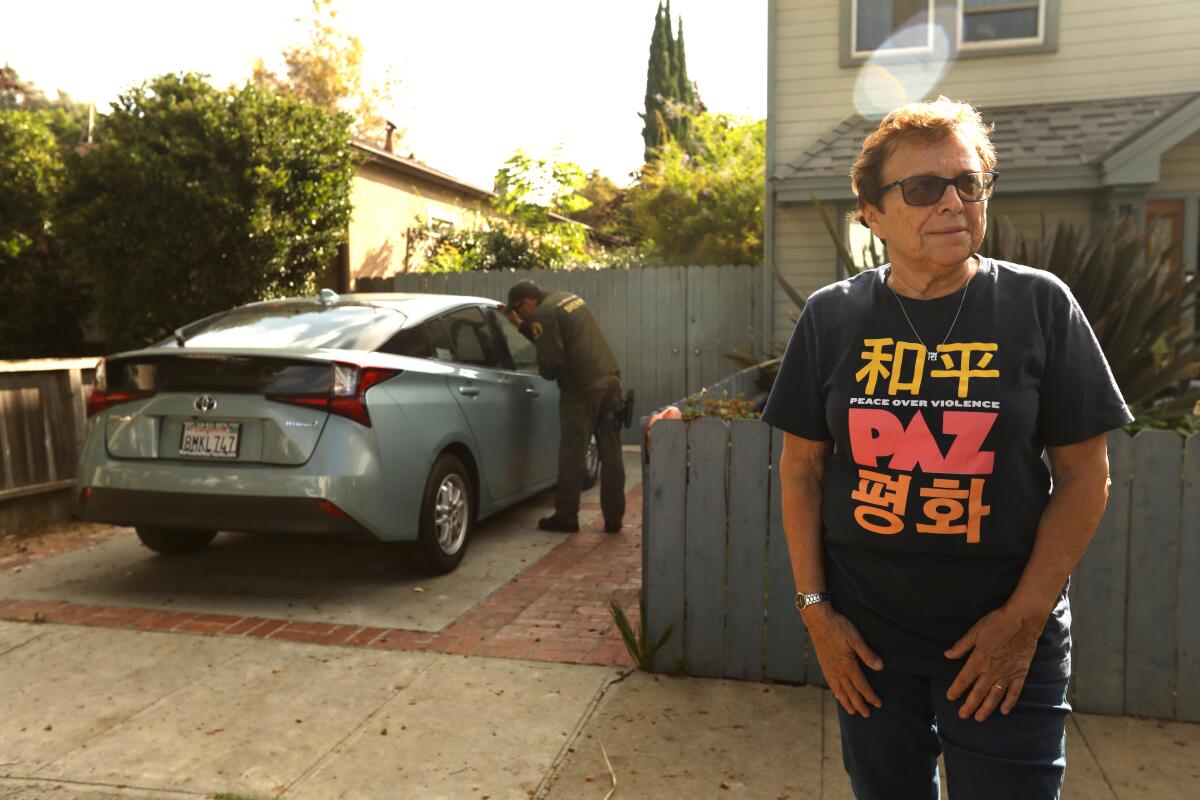
Giggans worked informally with Metro on an ad strategy and slogan: “It’s Off Limits.” Giggans then told the agency that if it wanted more help, the nonprofit would need to be paid, she said in an interview. Peace Over Violence received $105,000 for consulting on the anti-harassment campaign in 2015 and 2016, purchase orders show.
Marc Littman, who at the time ran Metro’s public relations department, said Kuehl’s office had nothing to do with that initial work. “They did not put their thumbs on the scale,” he said.
The consulting work turned into something larger after three Metro board members — Supervisor Mike Antonovich, Los Angeles Mayor Eric Garcetti and Kuehl — instructed staff to curtail harassment in part by hiring an outside group to offer victims “non-law enforcement support.”
Peace Over Violence proposed a 24-hour hotline for $160,000 a year. Metro “loved the idea” and didn’t invite any other groups to bid, Giggans said.
Kuehl said she first learned about the hotline when she was invited to Union Station to announce its launch.
The hotline started taking calls in 2017. Peace Over Violence’s contract to run it was renewed in 2018, and Metro staff then extended the contract for another three years for almost $495,000. Had the total been a few thousand dollars higher, the Metro board would have voted on the deal. As it was, Kuehl and the agency’s 12 other board members didn’t have a say.
The hotline was overseen by Loew, she and Giggans said. Peace Over Violence routinely competes for contracts, Giggans said, and would have done so for this one if Metro had asked.
“We followed all her rules,” Giggans said of Loew. “Then she turned on us.”
By 2019, Loew was running into disciplinary trouble on the job, records show. Multiple subordinates complained that she “engaged in abusive, humiliating or demeaning conduct,” according to court papers filed by Metro’s inspector general.
An internal investigation concluded that Loew had done nothing illegal, but was “intimidating” to staff. A county attorney told her in a letter that Metro would “not tolerate conduct of this nature.”
Sheriff Alex Villanueva is fighting battles on multiple fronts and, with a couple of weeks before election day, is fighting for his political survival.
Within weeks of being admonished, Loew began alleging corruption at Metro, court records show. She zeroed in on the Peace Over Violence contracts, claiming that $2,000 in donations Giggans made to Kuehl’s campaign for supervisor in 2013 and 2014 had been bribes to secure the contracts. Metro staff, Loew said, were in on the “quid pro quo” and pushed the deals forward to stay in Kuehl’s good graces.
The agency’s inspector general, Karen Gorman, hired an outside attorney to investigate Loew’s accusations. The findings are confidential, but her office reports evidence of illegal activity to law enforcement and did not do so in this case, Gorman said in a sworn court statement.
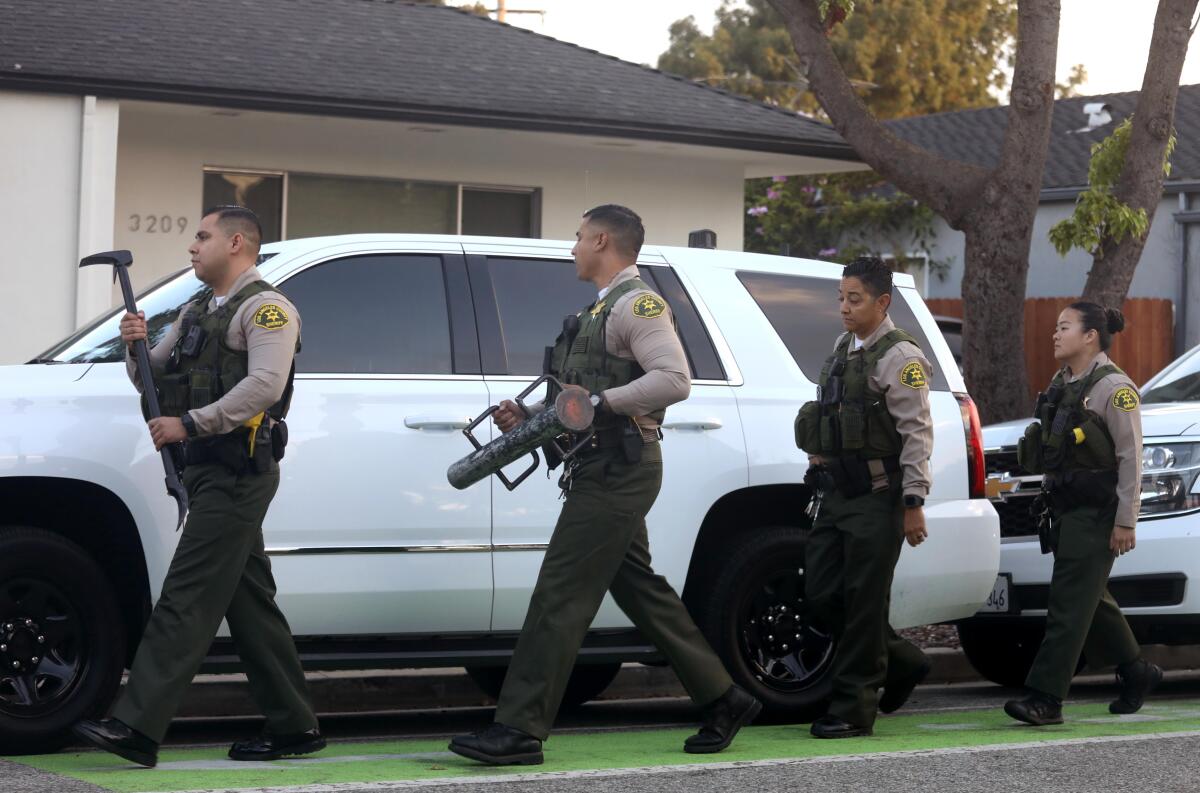
Loew also took her complaints about Metro corruption to the FBI, the Los Angeles Police Department and the L.A. County district attorney’s office, she said in a court filing. There has been no sign that any of them pursued the case.
But the Sheriff’s Department dispatched two detectives to take her report in September 2019, Loew said in court papers. The investigation had begun.
The case was assigned to a public corruption squad formed by Villanueva and other top sheriff’s officials. It is overseeing criminal investigations of Kuehl and others who have challenged his authority, including Max Huntsman, the department’s inspector general. Critics say Villanueva uses the group to target political enemies.
The Kuehl investigation seemed to pose an obvious conflict of interest for Villanueva: She and Giggans, who is Kuehl’s appointee on the county Civilian Oversight Commission, a watchdog on the Sheriff’s Department, had often clashed with Villanueva. He, in turn, lashed out at them, accusing them of trying to sabotage him.
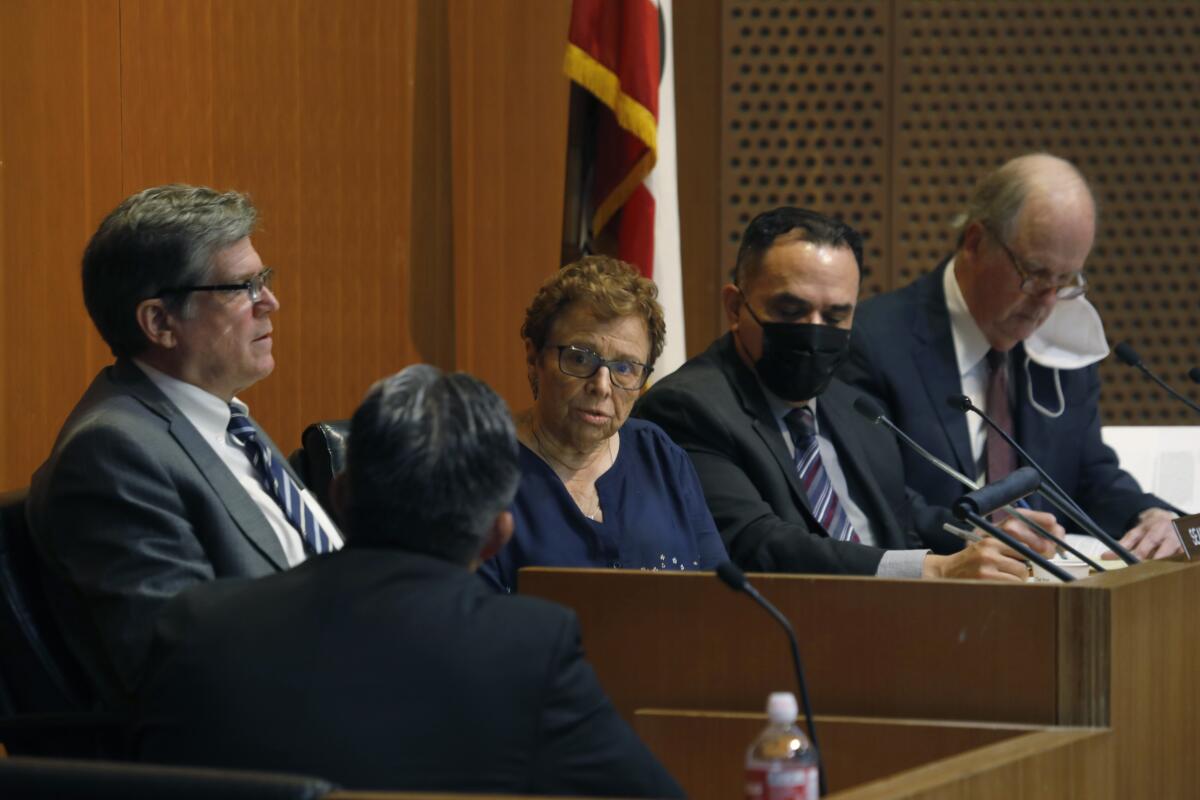
But instead of handing the case off to federal law enforcement or the district attorney’s Public Integrity Division, the Sheriff’s Department pressed ahead. Villanueva said he would recuse himself from the investigation.
A first round of search warrants came in February 2021, targeting the offices of Peace Over Violence, Metro and the agency’s inspector general.
Peace Over Violence turned over boxes of records. After reviewing them, Max Fernandez, the sheriff’s detective leading the investigation, told an attorney for the group in an email that Giggans “does not seem to have any fault in this matter” and “might have been tossed in the group hastily.”
Metro and its inspector general went to court to challenge the warrants, which sought records on the hotline contracts. Metro attorney Robert Dugdale called the warrants a harassment tool and questioned the investigation’s legitimacy.
A little-known team of investigators in the L.A. County Sheriff’s Department has pursued criminal investigations into some of Villanueva’s most vocal critics.
By then, prosecutors in the district attorney’s office were already refusing to work with Villanueva’s corruption unit because he was “only targeting political enemies,” Dist. Atty. George Gascón told The Times. (Villanueva backed a campaign to have Gascón recalled from office.)
The district attorney’s “position speaks volumes about the validity of the warrant and the tactics being employed by the Sheriff’s Department,” Harvinder Anand, an attorney for Metro’s inspector general, wrote in a court filing.
The Sheriff’s Department nonetheless asked Gascón’s office to file charges. After reviewing the case Fernandez had compiled, prosecutors demurred, concluding the “state of the evidence at that time did not prove criminal conduct beyond a reasonable doubt,” a district attorney’s office spokesman said.
During the investigation, Villanueva met at least twice with Loew and her husband but said he has not discussed the case with them. The couple has promoted the sheriff’s reelection campaign on the Instagram account they run for their 8-year-old daughter, a skateboarder who has built a following on social media.
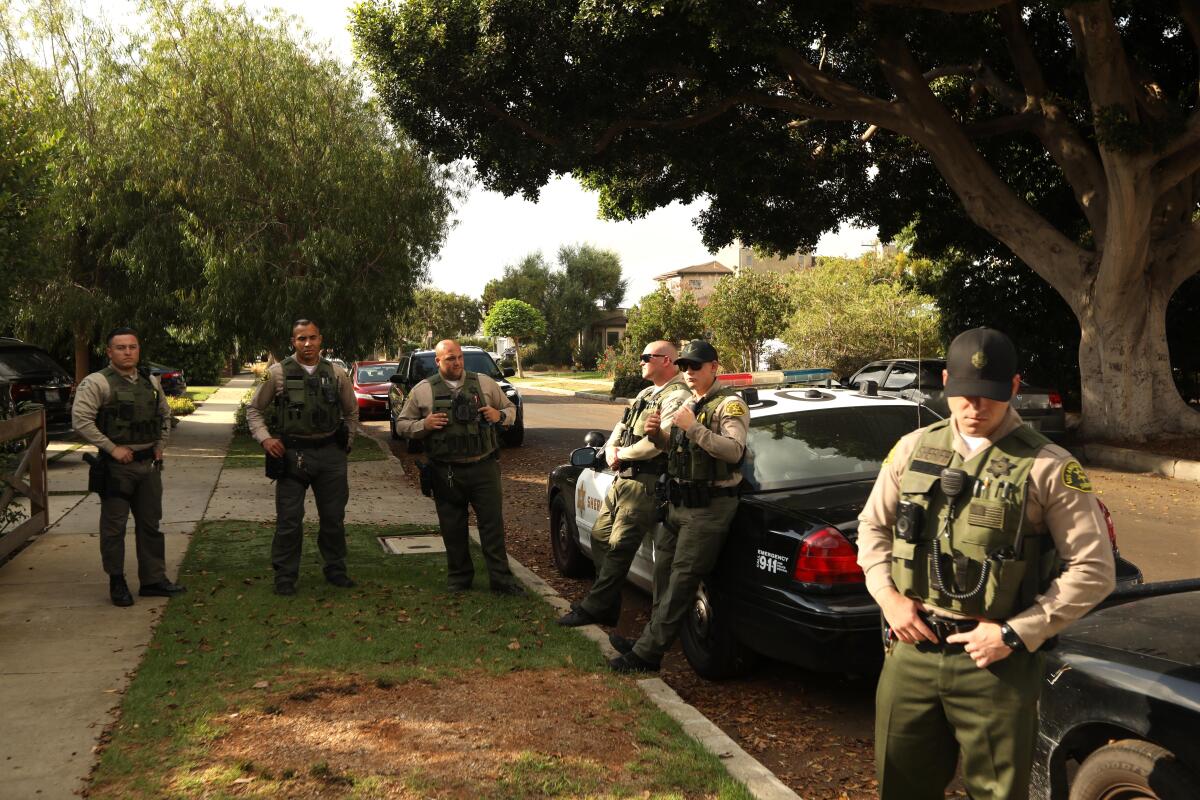
Tussling over the warrants dragged on for 18 months. Villanueva called the court challenges an attempt to “run out the clock so the statute of limitations could expire.” “That was their whole game plan,” he told The Times.
Superior Court Judge Eleanor Hunter eventually ordered the Sheriff’s Department to trim the scope of the warrants. On Sept. 1, she said she would appoint a neutral special master to screen seized communications for confidential attorney-client material.
But the Sheriff’s Department was in a rush.
While Hunter was on vacation the following week, Fernandez took a new batch of warrant requests to another judge, Craig Richman. An attorney for Kuehl called the switch to a new judge “highly suspicious” in court papers, but another judge found no impropriety.
The warrants were politically explosive. In addition to Metro, its inspector general and Peace Over Violence, the department sought approval this time to search the homes of Kuehl and Giggans and the supervisor’s downtown office.
In his warrant request, Fernandez said the searches might yield proof of bribery and related crimes. He quoted Loew as his sole witness, but again produced no evidence of bribery.
In an interview, Loew declined to identify any evidence she had of bribery, saying the settlement of a discrimination and retaliation lawsuit she filed against Metro barred her from discussing it. Metro paid Loew $625,000 to resolve her lawsuit, but did not admit wrongdoing.
Her husband, Adam Loew, pointed to Giggans’ contributions to Kuehl’s campaign as evidence of bribery. Asked again for evidence of a crime, he responded: “I’m going to stop this interview, because this is going to be a hit piece on Alex.”
Shortly after sunrise on Sept. 14, sheriff’s detectives pulled up to the homes of Kuehl and Giggans and started the searches, collecting their phones, computers and files. They loaded Giggans’ Prius onto a flatbed and hauled it away.
The devices seized from Kuehl and Giggans contained confidential communications with Huntsman, the chief watchdog over the Sheriff’s Department.
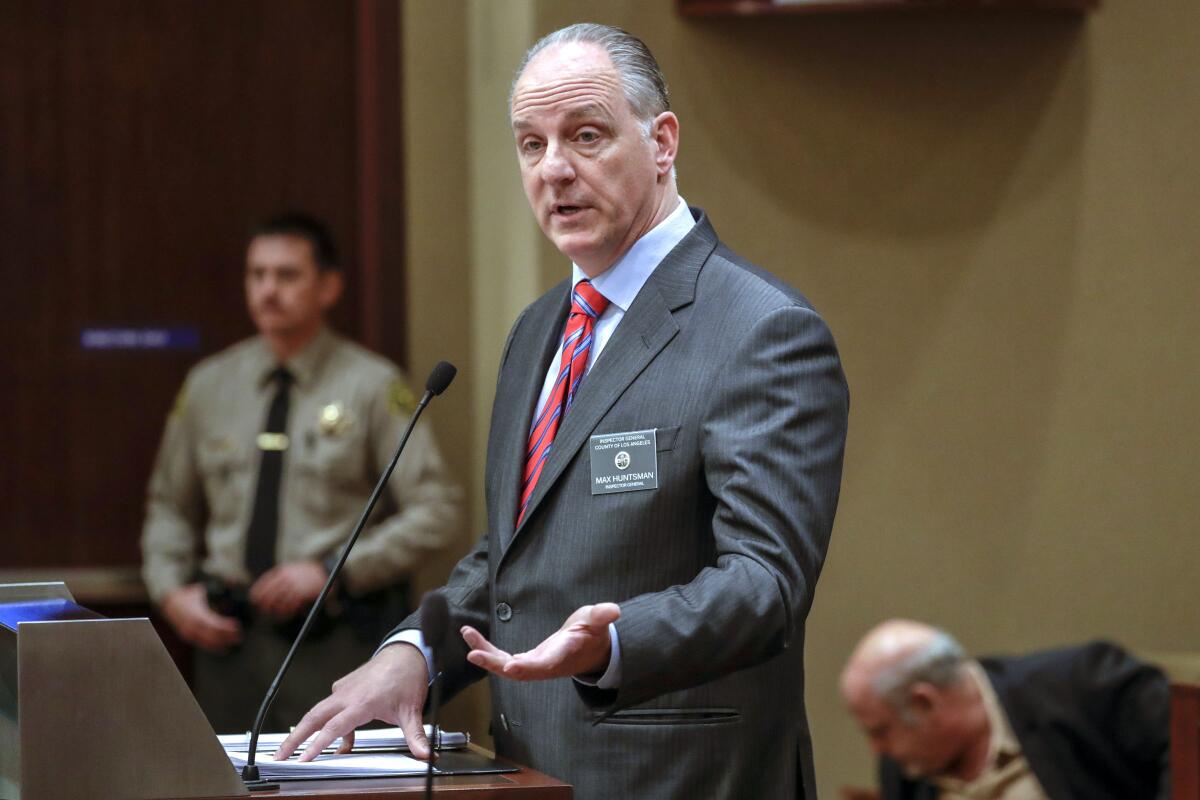
Huntsman said in a court statement that he’d been sharing information with them for years about oversight investigations of groups of deputies who behave like gangs and “potential police misconduct by Sheriff Alex Villanueva.”
Disclosure to the Sheriff’s Department “would almost certainly harm and compromise these investigations,” he said.
Dugdale, the Metro attorney, said the possible spoiling of those cases was reminiscent of the strong-arm tactics of former Sheriff Lee Baca, who was sentenced in 2017 to three years in prison for obstructing a federal investigation of deputies’ abuse of jail inmates.
“These brazen actions, which reflect a mindset more typical of a dictator operating in a Banana Republic than that of” an L.A. sheriff, “may be even more sinister than they appear at first blush,” Dugdale wrote in a court filing.
The new warrants were unusual in other ways. In his application, Fernandez had told Richman, the judge who signed them, that he planned to execute them with assistance from the FBI. But no FBI agents participated in the raid, an FBI spokeswoman said.
The application also did not mention that Hunter, the judge overseeing the first batch of warrants, planned to name a special master to protect confidential records from disclosure to the Sheriff’s Department. The new warrants were executed with no special master.
Fernandez told the judge that Jennifer Loew, whose lawsuits against Metro were not disclosed in the warrant request, might join detectives and FBI agents on the raid of Metro’s headquarters at Union Station so she could “identify the exact desktop computers that contain the evidence sought.”
Instead, Loew said in the interview, while she was driving downtown on the 101 Freeway before dawn on Sept. 14, Fernandez called to ask her not to come, saying word of the raids had leaked. Loew said she wound up sitting in Metro’s cafeteria during the search.
Upstairs, sheriff’s detectives were seizing computers from four Metro employees whose devices it did not have court permission to take, according to the agency’s attorneys.
A spokesperson for the Sheriff’s Department declined to answer questions about the warrants, but said in a statement that they were valid and approved by a judge. “It is disconcerting some elected and appointed officials view themselves above the reach of the law,” the statement said.
Standing outside her home during the search, Kuehl told reporters she had been tipped off to the impending raid the previous evening by a county lawyer. In a letter to state Atty. Gen. Rob Bonta, Villanueva demanded a criminal investigation of the leak.
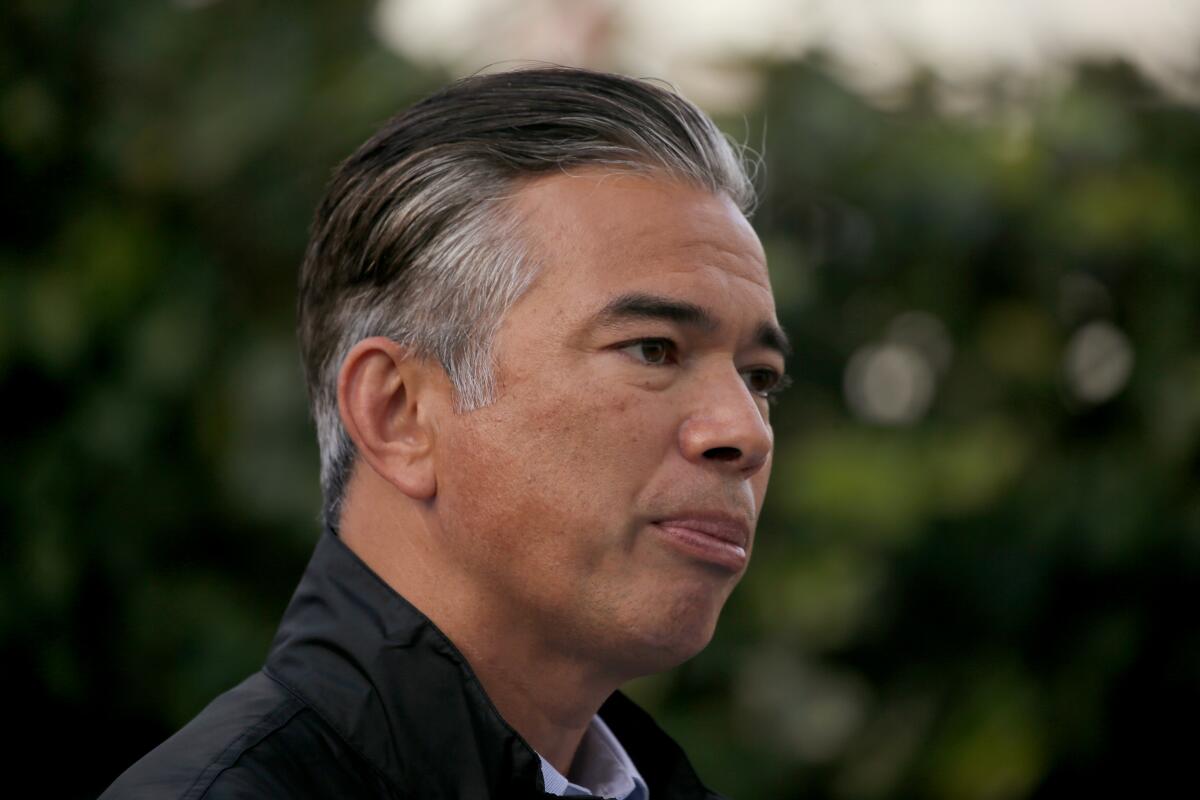
Two days after the warrants were served, Fernandez read 250 text messages and listened to two voicemails on Kuehl’s phones to determine who told her about the warrant, he said in a court statement. No judge authorized that search.
Bonta agreed to investigate the leak. But he also announced it was “in the public interest” for the state attorney general’s office to take over the entire investigation of the Peace Over Violence contracts.
He ordered the Sheriff’s Department to “cease investigative activity” and stop making public statements or court filings about the case. All evidence and records from the investigation, Bonta instructed, needed to be turned over to the state Department of Justice.
Los Angeles County Sheriff Alex Villanueva is in a tight race to keep his job, with retired Long Beach Police Chief Robert Luna emerging as the front-runner.
Since then, Villanueva has continued to talk about the case extensively, claiming that Bonta might bury the investigation.
“Imagine if the attorney general’s office is compromised, and their whole effort is to whitewash the Board of Supervisors’ corruption,” Villanueva said at a news conference livestreamed on Facebook. He suggested that Bonta’s investigators could be obstructing justice.
It was yet another attack on those who oversee Villanueva and his force: For two years, the attorney general’s civil rights enforcement team has been running a sweeping investigation of suspected misconduct in the Sheriff’s Department, court records show.
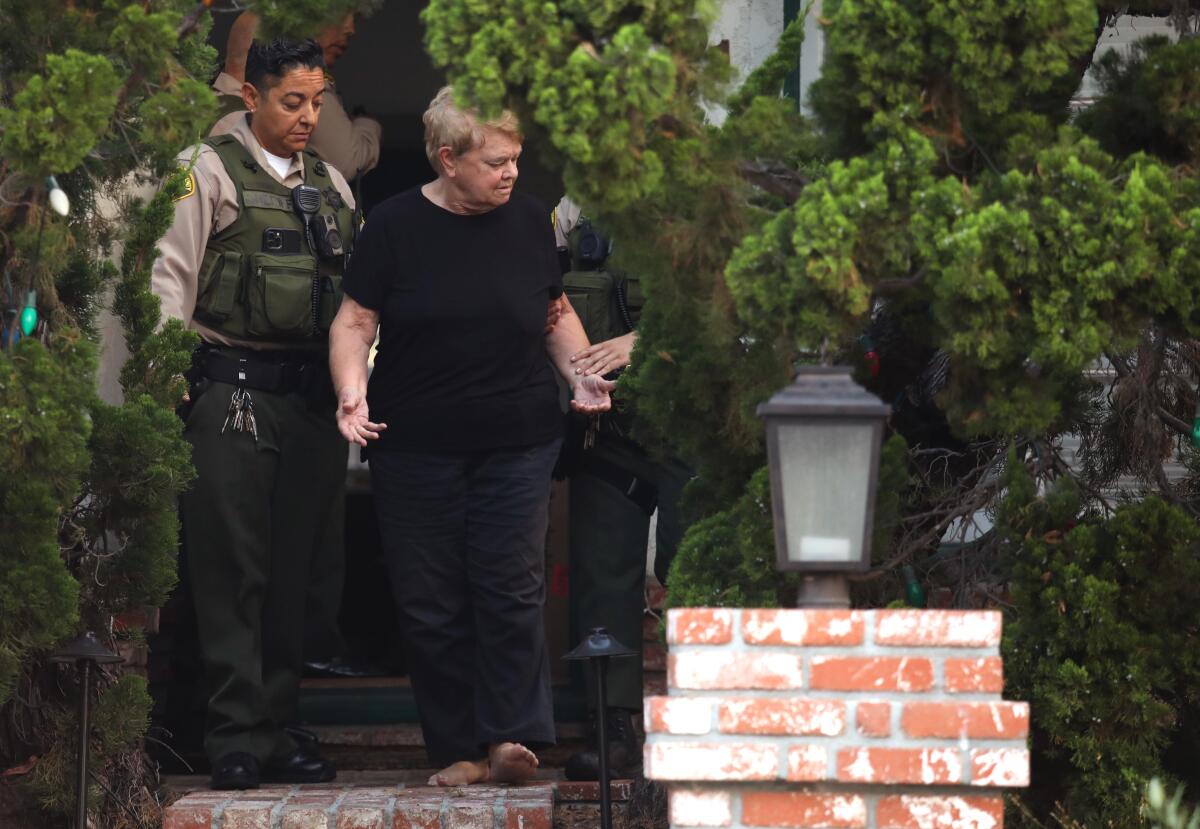
In a sworn court statement, Villanueva falsely alleged that an agent in Bonta’s office had directed Fernandez in an Oct. 24 email to delete and destroy “all files and records related to the investigation.”
What the agent actually said was that the Sheriff’s Department must confirm “it did not maintain any evidence” from the case and had turned it all over to the state, the email shows.
Asked to explain his court statement, Villanueva said there was “more communication than just the email,” but did not say why he had mischaracterized it.
At a recent court hearing on the warrant disputes, Judge William C. Ryan said he’d watched Villanueva’s news conference during his lunch break. He asked Paul Seo, a deputy attorney general, whether the state had asked, or was planning to ask, the Sheriff’s Department to destroy evidence.
Seo responded: “No, your honor.”
Times staff writers Brittny Mejia and Alene Tchekmedyian contributed to this report.
More to Read
Sign up for Essential California
The most important California stories and recommendations in your inbox every morning.
You may occasionally receive promotional content from the Los Angeles Times.
